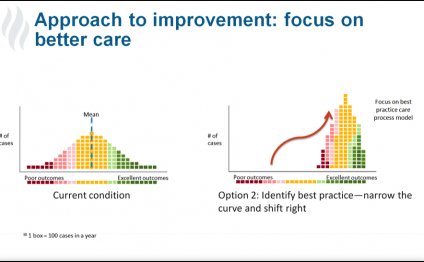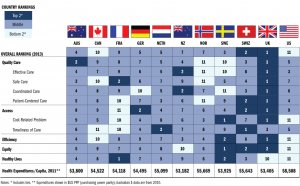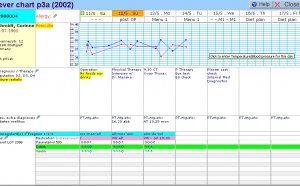
Quality Improvement Systems in Healthcare
Paul B Batalden, Center for Evaluative Sciences, Dartmouth Healthcare Class, Hanover, New Hampshire, USA
Frank Davidoff, Institute for Healthcare Improvement, Cambridge, Massachusetts, USA
Communication to: Dr P B Batalden
Center for Evaluative Sciences, Dartmouth Health Class, Hanover, NH 03755, United States Of America
Short abstract
Transformation of healthcare—quality improvement
Many in healthcare today are interested in determining “quality improvement”. We propose determining it while the combined and unceasing attempts of everyone—healthcare professionals, clients and their families, researchers, payers, planners and educators—to make the changes that will cause better diligent effects (wellness), better system overall performance (treatment) and much better professional development (learning; fig 1). This definition arises from our conviction that healthcare cannot realise its complete potential unless change making becomes an intrinsic element of every person's task, day-after-day, in every parts of the machine. Defined in this way, enhancement requires a considerable change in our concept of the job of health care, a challenging task that will benefit from the using numerous tools and techniques (dining table 1).
Figure 1 related goals of improvement.
Table 1 Illustrative tools and techniques in improvement
Although all improvement involves modification, not totally all modifications are improvement. If health care will gain fully from the technology of infection biology, we need to make sure the changes we make systematically include generalisable systematic knowledge. To steer our design of change, we must characterise the options in which care is truly delivered (microsystems, mesosystems and macrosystems) in sophisticated means. Moreover, to understand that change is creating improvement, we require precise and powerful dimensions of what is occurring. We propose a straightforward formula that illustrates the way in which these forces incorporate to create enhancement (fig 2).
Figure 2 Formula illustrating the way knowledge systems incorporate to make enhancement.
All the five-elements inside equation is driven by an unusual knowledge system (dining table 2). The generalisable scientific knowledge we want (element #1) is made of empirical researches that really work to regulate context as a variable, hence minimising or getting rid of its influence on what exactly is becoming studied. An understanding of particular contexts (element no. 2) is produced by enquiry to the identity of neighborhood treatment settings—their procedures, habits and traditions. Knowledge regarding the effect of improvements on system overall performance (element # 3) calls for special types of measurement, practices that include amount of time in the evaluation, as all enhancement requires change over time; gaining this understanding additionally needs the application of balanced actions that accurately mirror the richness and complexity associated with phenomena under scrutiny. The “+” expression (element # 4) presents knowledge about the countless modalities, including standardisation, forcing functions, academic detailing, and so on, that are available for using and adjusting generalisable evidence to certain contexts. The “→” logo (element number 5) signifies the data necessary for execution—what you should know to “make things happen”, the drivers of modification, in a specific location. It requires knowing where energy resides and exactly how it's asserted; it requires knowledge of the strategic goals, the most common methods of conducting work with that setting, the methods for which individuals are recognised and compensated, together with ways they've been held responsible for their particular work.
Dining table 2 qualities of five understanding systems tangled up in improvement
Acquiring these five forms of understanding requires both systematic and experiential understanding. Expression on the nature of these five knowledge systems, how they grow and alter, plus the ways that they work collectively to move research into practice will be important when we are likely to read about understanding. Doing so will create a kind of “metaknowledge” which is essential over the long run in getting increasingly much better at improvement.
Of course, much better knowledge alone doesn't guarantee improved overall performance; if these five understanding methods will be efficient, we must pay careful attention to the way in which we deploy all of them. It's something to anticipate a specially commissioned “QWe team” to-be actively engaged in creating and testing the countless changes necessary for better patient and population outcomes, better system overall performance and better expert development; it really is very another to expect everybody taking part in health to do so, and do this everyday. When it comes to universal rehearse of modification testing to happen, those taking part in supervising the work of healthcare—from the front line on front offices—might, for example, be anticipated to supply specific, expert help and assistance to those they supervise as they design and execute examinations of change. The design asserting that much better health outcomes, much better care delivery and much better professional development tend to be inextricably linked (fig 1) recognises that mutual assistance and stimulation among these three domain names encourages both durability and unending creativity in their attempts.
Drawing everyone definitely to the procedure for testing modification, on a regular basis, presumes that everybody will develop a simple understanding of the requirements of the work, as well as the abilities they need to test changes in that really work. Making enhancement take place additionally calls for leadership that enables contacts involving the goals of changes therefore the design and evaluating of the changes; that pays severe awareness of the guidelines and practices of reward and responsibility; and unshakeable belief in idea that every person in healthcare actually has actually two jobs if they arrived at work each and every day: to-do their work and to improve it.
Footnotes
Share this Post
Related posts
Best Healthcare Systems in the World
Luxembourg City in the winter.Barbara TaschThe Legatum Institute, a London-based study institute released its 10th yearly…
Read MoreImportance of Information Systems in Healthcare
Goal Use health communication strategies and wellness I . t (IT) to improve population wellness outcomes and healthcare high…
Read More
















